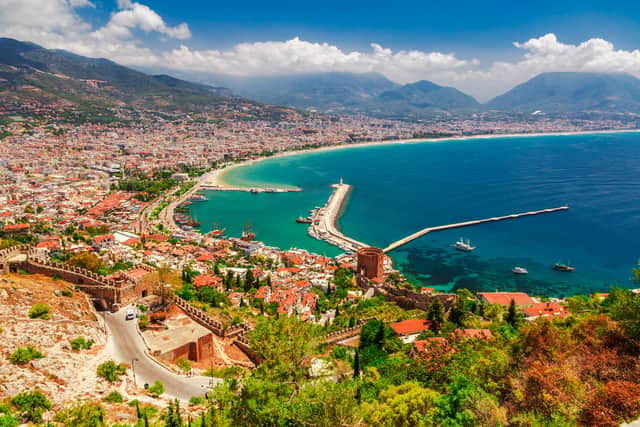Turkey travel warning as UK Foreign Office updates advice after spike in salmonella cases
and live on Freeview channel 276
British holidaymakers going to Turkey have been issued a travel warning following a recent spike in salmonella cases.
More than 240 travellers returning to the UK from Turkey since the beginning of this year have been struck by the bacterial disease, the UK Health Security Agency (UKHSA) has said.
Advertisement
Hide AdAdvertisement
Hide AdA total of 241 people have suffered the bacterial form of food poisoning, although it is understood that no single source of the infection in Turkey has been found. The UKHSA has said that the majority of the cases originated from the Antalya region of Turkey, with 56% of these being among men and the average age being 29.


These cases were detected among holidaymakers staying in several different hotels in Turkey, with most of those infected reporting eating a wide variety of different foods within their hotel resort as part of an all-inclusive holiday package.
In response to the recent rise in salmonella infections, the UK Foreign Office has updated its travel advice for holidaymakers. It said: “UKHSA has detected an increase in gastrointestinal infections in travellers returning from Turkey, with over 200 cases of Salmonella detected since the beginning of 2023. Further information is available from UKHSA.”
The overall travel update also includes information for people to help keep them safe and well on holiday, including looking up local health risks before travel and ensuring they have the right vaccinations.
Advertisement
Hide AdAdvertisement
Hide AdInformation on specific health risks, including recommended vaccinations, can be found on the TravelHealthPro website and from the foreign travel advice on gov.uk.
The UKHSA advises that people thoroughly wash their hands while travelling abroad, especially after using the toilet and before preparing or eating food.
It adds: “Recently prepared, thoroughly cooked food that is served piping hot, fruit that can be peeled by the traveller (such as bananas and oranges), and pasteurised dairy produce such as yoghurts, milk and cheese are good options for travellers.
“Ensure perishable foods are kept cool in the fridge or freezer where possible. People feeling unwell with gastrointestinal illness should avoid preparing food or drinks for others until they are free of symptoms.”
According to the NHS, symptoms of food poisoning include:
Advertisement
Hide AdAdvertisement
Hide Ad- feeling sick
- diarrhoea
- being sick
- stomach cramps
- a high temperature of 38C or above
- feeling generally unwell, such as feeling tired or having aches and chills
Symptoms will usually start within a few days of eating the food that caused the infection, but in some cases they can develop after a few hours or not for a few weeks. Symptoms should usually pass within a week and it is important to drink lots of fluids, such as water or squash, to avoid dehydration.
People should also ensure their families are up to date with routine vaccinations such as measles, mumps, and rubella (MMR), as these infections can be more common in other countries, the UKHSA said. It also warned people to take care in the heat, including drinking plenty of water to help prevent dehydration, and wearing sun cream, hats and sunglasses.
The UKHSA is currently liaising with ABTA, the Turkish public health authorities and other international public health partners to inform investigations on rising cases of salmonella.
The UK Health Security is liaising with ABTA, the Turkish health authorities and other international public health partners to investigate. The government health body is also working with the National Travel Health Network and Centre (NaTHNaC) to ensure appropriate advice is in place for UK travellers.
Comment Guidelines
National World encourages reader discussion on our stories. User feedback, insights and back-and-forth exchanges add a rich layer of context to reporting. Please review our Community Guidelines before commenting.
